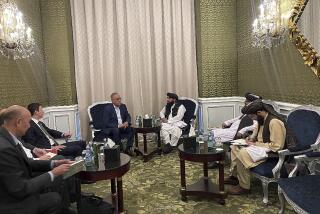Four countries call on Taliban to come to Afghan peace table
- Share via
Reporting from Kabul, Afghanistan — Delegates from four countries called on the Taliban to resume peace talks with the government of Afghanistan as the U.S.-backed diplomatic push gathered momentum.
Representatives of the governments of Afghanistan, Pakistan, China and the United States met in Kabul on Monday, one week after the first meeting was held in the Pakistani capital, Islamabad.
Representatives of the Taliban did not attend. Although some insurgent leaders had previously indicated interest in opening talks with the Kabul government, there have been fewer signs recently of the Taliban’s willingness to negotiate as the group seizes more territory in parts of Afghanistan.
In a statement, the countries said they called on Taliban factions to “enter into early talks with the Afghan government to resolve all differences.” The next meeting of the group was set for Feb. 6 in Islamabad.
See more of our top stories on Facebook >>
Monday’s meeting came as the Taliban and other militant groups, including fighters claiming allegiance to the Iraq- and Syria-based Islamic State, continue to conduct increasingly audacious attacks throughout Afghanistan.
Afghan Foreign Minister Salahuddin Rabbani, speaking at the meeting, warned the Taliban that “any delay in coming to the table will put the [group] in a corner” and show that its aim is not peace.
Despite gains on the battlefield, the Taliban has reportedly suffered from infighting since the announcement last summer of the death of its founder and leader, Mullah Mohammad Omar. Rival Taliban factions have spoken out against Omar’s successor, Mullah Akhtar Mohammad Mansoor, prompting fears among many Afghans that the insurgent group is not united enough to be a negotiating partner.
Waheed Muzhda, a former official in the Taliban government that ruled Afghanistan until the U.S.-led invasion in 2001, said the reports of infighting have been exaggerated.
“There have been internal conflicts within the Taliban as far back as 2001, but a few leaders took the announcement of Mullah Omar’s death as an advantage to announce publicly their disagreements with Mullah Mansoor,” Muzhda said.
The men challenging Mansoor lack the battlefield resources to present a military threat to the main Taliban movement, Muzhda said.
Despite the questions surrounding the Taliban, and its significant territorial gains in the southern province of Helmand in recent months, the four-nation group said it remained optimistic about the prospect of “Afghan-led and Afghan-owned talks.”
This is the latest attempt to bring the Taliban to the negotiating table to end more than 14 years of conflict. The Afghan government has previously tried to start both direct and indirect talks, and the United States and several European governments initiated contacts with Taliban delegates based in the Persian Gulf sheikhdom of Qatar that eventually fell through.
The current process is seen as having the best chance because of the involvement of Pakistan, where the Taliban’s main leadership is based.
Afghan leaders have called on Pakistan to take action against Taliban factions that reject talks. The four nations’ joint statement said they all were committed to “eliminate all forms of terrorist groups, regardless of their national origin, operating in their respective territories.”
Latifi is a special correspondent.
ALSO
Taliban denies role in latest Afghanistan bombing
Indonesian police arrest 12 after Jakarta attack
India faces questions over its handling of a militant attack
More to Read
Sign up for Essential California
The most important California stories and recommendations in your inbox every morning.
You may occasionally receive promotional content from the Los Angeles Times.










